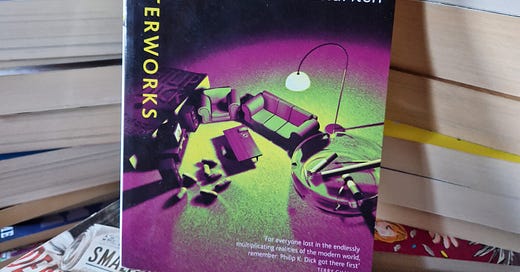Philip K Dick draws up a familiarity between faith and drugs, and their effect on how we perceive reality with "The Three Stigmata of Palmer Eldritch". The nature of this book leaves you to think for yourself about what it all meant, but that doesn't mean there's an unfinished quality to it - in fact I think this may be one of Phil's best.
Reality - what is it? I'm forever fascinated by this topic, which is part of why I find Phil such an interesting author; his obsession with subjective reality and external influences on it make for an intoxicating, paranoid reading experience. In particular, I'm fascinated by the effect an observer has on someone, or something, else's reality. Check out the "double slit experiment". Both this experiment and Phil's writing pose the question: is it real just because you can see it? And if you're the one causing that reality to happen, are you yourself God?
In some form or another, this theme of authenticating reality is ever-present in Phil Dick's work, expressed with varying degrees of coherency. "The Three Stigmata Of Palmer Eldritch" is one of the better ones.
It's true that this book can get complicated through its multi-layered ideas about illusory and hallucinatory worlds, but it never pushes beyond the point of enjoyment. The pace of the thing, alongside Dick's dry sense of humour, keep your head on straight despite just how mind-bending and anxiety inducing the theme can get.
"But an artist, he realized. Or rather so-called artist. Bohemian. That's closer to it. The artistic life without the talent."
Phil's secret weapon: easy reading; hard themes. It's usually only after finishing his books that you realise how philosophically important they are. Like a punchline fading out to reveal existentialism.
Character writing is rarely one of Phil's strongest assets, especially when it comes to women, and I'm not about to tell you this book is any different. What this book does contain, though, is one of the literary worlds' greatest antagonists. Palmer Eldritch is truly terrifying. He's scary not because he's got big claws and gnashing fangs but because his motivation seems just beyond comprehension. His demeanour, too, is inhuman. Diety-like he carries an air of the Unknown.
Palmer Eldritch's possession of reality-bending drugs from another star system acts as both the focus of the plot--a corporate takeover thriller, espionage included--and allegory for bringing a new faith into the world. This human(ish) traveller merchant returns from Proxima as if from the dead with promise of paradise like Christ returning but with a grudge. The drug is a welcomed sight to the already drug reliant citizens living on the various moons and planets in our solar system (this drug theme serves also as a kind of observation on people living hard, tedious lives, an interesting flavour of dystopia in itself).
On the subject of Phil's characters I would also like to point out that while a lot of them are mediocre I do admire their normalcy. Phil always writes Nobody's as his protagonists: TV repairmen; ceramic pot menders; stamp collectors. His heroes are all cut from the same cloth, and it is a cloth I like to read. There are no gun slinging bad-asses; only confused, scared, slightly hopeless conduits through which Phil's visions of the world are revealed. Barney Mayerson, this books protagonist, is middle of the road Dick writing, but he's not terrible. Forgettable, maybe, but I did enjoy his line of work. Very amusing.
I'll conclude by saying that I loved this book. It is certainly one of Dick's best and probably THE best early example of his work. A good place to start if you've not read any of his stuff.





Top review.